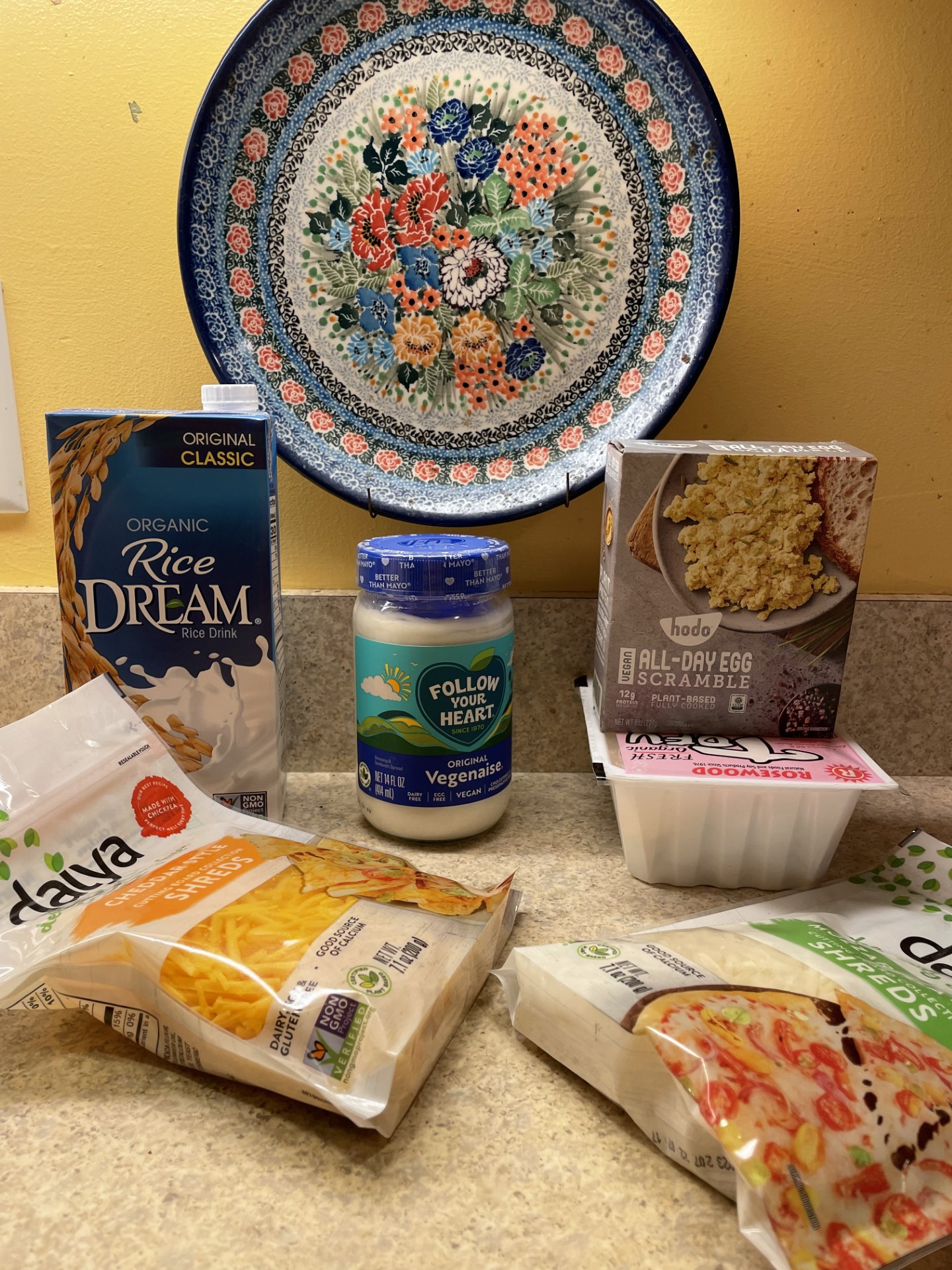
Photo Legend: Pictured are some vegan foods to use during the 30-Day Pledge, including:
Rice Dream plant milk, Follow Your Heart Veganaise (vegan mayo), All-Day Egg Scramble
(Plant-Based), Daiya-Brand Cheddar-Style and Mozzarella-Style Shreds (products were
recommended by VegMichigan in a previous pledge year!)
On Wednesday, January 22nd, VegMichigan will be joining us at WCC during Welcome Day where students have the opportunity to take home free food if they commit to the 30-Day Pledge! But what is the pledge? Simply, VegMichigan is challenging us each to incorporate more plant matter into our diets for at least 30 days in hopes to teach us about the importance of health while also promoting sustainability. For those of us striving to align our lifestyles with environmental values, there are many ways to contribute to sustainability through what we eat. By educating ourselves about where our food comes from and making small, mindful changes, we can support the health of the planet and our own well-being. By exploring the connection between our food choices and the health of the Earth, we can inspire meaningful change, both personally and globally.
Environmentally, animal agriculture is the leading cause of deforestation and plays a significant role in climate change. Livestock farming produces a massive amount of methane—a greenhouse gas over 28 times more potent than carbon dioxide —while also clearing forests that would otherwise absorb CO2 from the atmosphere. This loss of trees accelerates and amplifies the impact of climate change. Additionally, plant-based foods require far fewer resources than animal products. For instance, producing just one pound of beef requires around 1,847 gallons of water, while the same amount of fruits and vegetables only uses 39 to 115 gallons. These water savings are especially important in areas facing drought and water scarcity. By reducing our consumption of meat, we can help conserve vital resources like water and land.
Incorporating more plant-based foods into our diet isn’t just a win for the environment—it’s also beneficial for our health. Plant-based foods are rich in fiber, antioxidants, vitamins, and minerals that support digestion, boost immune function, and lower cholesterol. Studies show that plant-based eaters tend to have lower rates of health issues such as obesity, heart disease, and certain cancers, along with longer lifespans compared to those who consume large amounts of meat and processed foods. The high fiber content in fruits, vegetables, and legumes also promotes healthy gut bacteria, which contributes to better digestion, mental well-being, and overall health.
Additionally, converting to a plant-based diet can help you out financially. An analysis from 2023 has shown that individuals who have made the choice to follow vegan lifestyles save an average of 16% when purchasing their groceries, or over $500 per year. There’s a common misconception that a vegetarian or vegan diet is more expensive, but because the raising of meat requires so many resources, the cost of meat is more expensive than vegetables, grains, and local fruits. This leaves you- the consumer –to foot the bill.
In short, here are the main benefits of taking on VegMichigan’s 30-Day Pledge:
- L eave a smaller carbon footprint
- Protect your health
- Save your money
VegMichigan has a list of ways you can accomplish this as well as other resources such as recipes.

Photo Legend: A graph comparing the amount of water in gallons used to produce one
pound of each food pictured. Vegetables are shown to require the least, while beef
requires the most water.
Photo Source: Denver Water – What’s The Beef?
Additional Reading
- Carbon Brief – Meat & Dairy
- Denver Water – What’s the Beef?
- EPA – Importance of Methane
- EPA – Preventing Food Waste
- JAMA Network: Analysis of Correlation between Diet and Finances
- MD Anderson – Benefits of a Plant-Based Diet
- PCRM – Vegan Diet Reduces Grocery Bill 16%
- VegMichigan – Recipes
Tags: Sustainability
